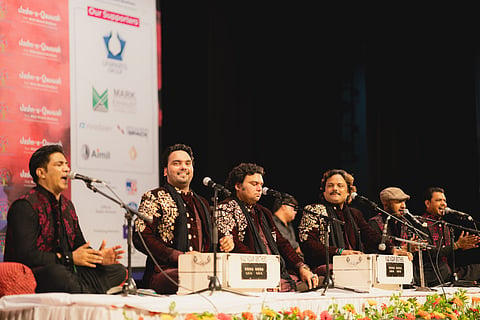
- Destinations
- Experiences
- Stay
- What's new
- Celebrating People
- Responsible Tourism
- CampaignsCampaigns
- SubscribeSubscribe
- Buy NowBuy Now

The history of Qawwali is intertwined with religion and dates back to the 13th century. The genre of music that had already begun to see intermittent formation with Persian influences burst forth on the scene in 13th century Indian subcontinent when Amir Khusrau fused his Islamicate musical sensibilities with the devotional tunes he heard in Indian temples and added an instrument of his own making to the ensemble, the tabla. Borne out of Sufi traditions and sites where dervishes whirled in an otherworldly ecstasy, the experience of a Qawwali mehfil is bound to be intense and a moving one.
Earlier this September, one such mehfil was also orchestrated by Niazi Nizami Brothers, torchbearers of the Hapur Gharana and the resident qawwals of Delhi’s famed Nizamuddin Auliya Dargah, under the banner of Jashn-e-Qawwali 2025, organised by the NGO Wishes and Blessings. Delhi's Kamani Auditorium nearly hit its roof off as the troupe went from one iconic composition to another, like Mera Piya Ghar Aaya and Mast Kalandar. While amateur theatre artists stood at the gates of Kamani and LTG Auditorium, inviting every and anyone who'd be willing to see their acts, and all other goings-on around Mandi House was quotidian, inside Kamani unfolded one such musical routine listening to which people could hardly keep themselves from dispensing their top praises in words and gestures.
The whole act kept a cause at its heart, namely that of remembrance for those whom society often forgets—the elderly abandoned by their own families. Over 650 people gathered to support the cause of building a permanent facility for Mann Ka Tilak, the NGO’s home for neglected and abused elders. The night became a reminder that cultural traditions, when harnessed with purpose, can be engines of transformation.
The spotlight of the evening shone on the Niazi Nizami Brothers as they exhibited their mastery of devotional music. For the occasion, the brothers concocted the traditional Sufi music with a fusion of filmy touch and a dash of brevity to make the numbers more palatable to the audience.
Their renditions of classics such as Chaap Tilak, Khwaja Mere Khwaja, and Dama Dam Mast Kalandar created waves of joy, with the audience breaking into claps, song, and even impromptu dance. In between, the brothers also read out Urdu couplets that ever so often are profundity incarnate and give a glimpse of vast sentiments in sleek words leaving the audience deeply touched and lending themselves more to their showmen. What was billed as a concert swiftly became a communion, a “Dance Qawwali” where the line between performer and listener disappeared. Thunderous calls of “once more” brought the troupe back on stage, as if the music itself was reluctant to end.
Amid the spirited revelry, the gravity of the occasion remained ever-present. Since 2018, Mann Ka Tilak has been offering food, medicine, shelter, and emotional support to elders who have faced neglect or outright abandonment. Yet the home remains small, unable to welcome all those in need.
The evening’s fundraising efforts were directed towards building a permanent facility—one that could expand capacity and ensure dignity for generations to come. This sense of purpose infused every note sung and every clap echoed in the auditorium.
Dr Geetanjali Chopra, founder of Wishes and Blessings, reminded the audience of the urgency of the mission. “It doesn’t matter if your own blood has abandoned you—we will never abandon you,” she declared, addressing residents of Mann Ka Tilak who were present as special guests. Her words drew both applause and quiet reflection, a rare moment of collective pause in an otherwise exuberant evening.
What emerged most powerfully from the event was the ability of music to bridge divides—between strangers in the audience, between artists and patrons, and between those with resources and those without.
“Music has the power to bring people together,” the Niazi Nizami Brothers reflected, “and it gives us immense joy to know that our performance is contributing to a meaningful initiative.” Their sentiment captured the spirit of the evening, one where art was not an escape from life’s hardships but a direct intervention in them.
This year marked the fourth edition of Jashn-e-Qawwali, and its growing popularity signals more than a cultural appetite—it signals trust in the mission it represents. Since its inception, the concert has evolved into a key fundraiser for the NGO, blending the timelessness of qawwali with the immediacy of social need.
Wishes and Blessings itself has, since its founding in 2014, worked across education, nutrition, elder care, and disaster relief. With operations now stretching across eight states, the organisation exemplifies how grassroots action can take on diverse, pressing challenges while remaining rooted in the simple principle of empathy.
By the end of the night, as the final notes faded and the applause softened, one message remained in the air: the need to create spaces of dignity for those societies often leave behind. The funds raised will help lay the foundation of a home that aspires to outlast the performers, the organisers, and even the donors—standing instead as a legacy of collective responsibility.
In an era when cultural events often dissolve into spectacle, Jashn-e-Qawwali was a rare reminder of the deeper role the arts can play. It married the intoxicating rhythms of centuries-old devotional music with the urgent call of a modern humanitarian crisis.
Delhi has long been a city where the past and present converse. On this September evening, that conversation found its most powerful expression yet—through qawwali verses that sang not just of saints and shrines, but of forgotten elders waiting for a home.
